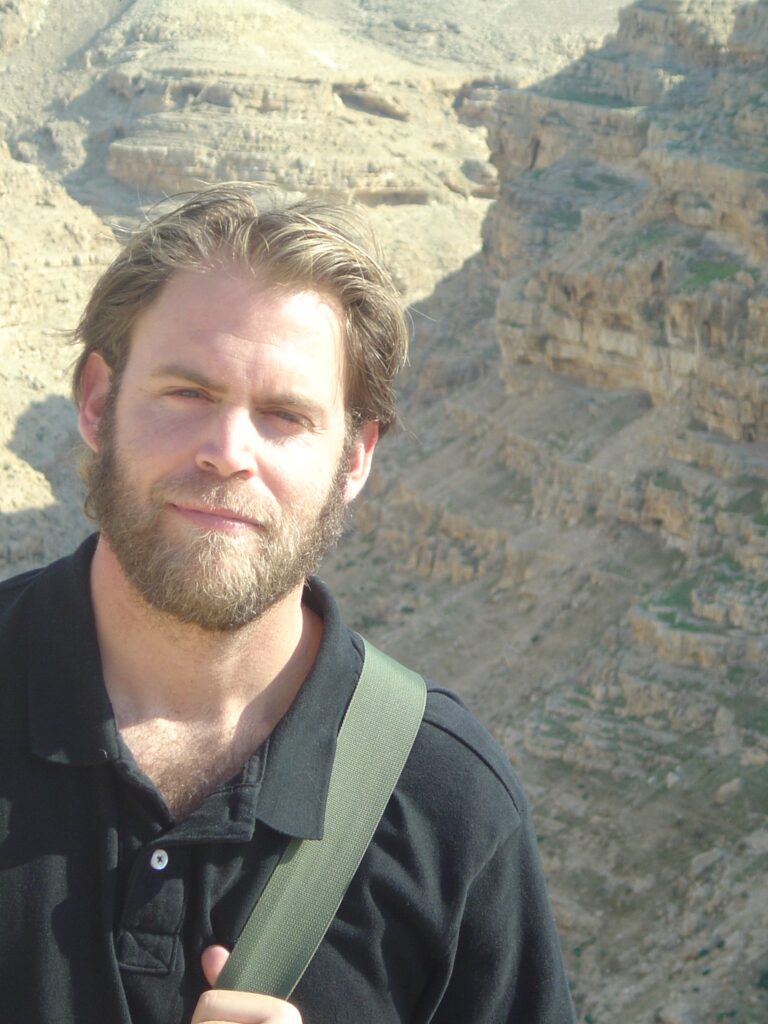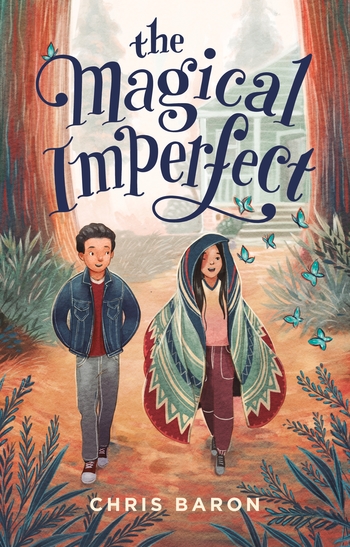In 2019, I interviewed Chris Baron about ALL OF ME, his fantastic middle-grade novel written in verse. I am thrilled to welcome him back to talk about his new middle-grade book, THE MAGICAL IMPERFECT (Feiwel & Friends/Macmillan, 2021).
Written in verse, THE MAGICAL IMPERFECT tells the story of Etan, who struggles with selective mutism. Although he is surrounded by people who love and care for him, Etan faces life challenges that can’t be easily fixed. Still, he forges a friendship with Malia who suffers from a severe skin condition. Sprinkle in a bit of Jewish wisdom, the gift of friendship, and a California earthquake, and THE MAGICAL IMPERFECT is a perfectly magical middle-grade novel.
Chris’s writing is captivating and engaging. I am a big fan of his work and so excited to chat about THE MAGICAL IMPERFECT.
Welcome back, Chris!
In THE MAGICAL IMPERFECT, Etan struggles with many life challenges, including his mom’s mental health, his aging beloved grandfather, his dad’s stress, and more. As a result of his own stress and anxiety, he literally loses his own voice. While he pulls away from friends at school, he is drawn to Malia. Why do you think he feels safe with her friendship?
I love this question. It’s a core mystery of the book–and the journey of their “safe” friendship is essential to the story. I know as a kid, when I would struggle with big changes that were way out of my control, I often found myself behaving a certain way that I couldn’t completely understand. I see this in my own kids as well. They experience something difficult, but react in various ways that sort of come out of nowhere. They lash out, get quiet, or draw something silly or surprising, but they don’t always associate it directly with an event or situation. They are processing. I know this is normal, but it can often be extreme. It seems like it’s the moments of authentic connection that help bring us back to who we are so we realize we don’t have to do it alone. A hug, a smile, a fun game, a song, a walk outside—all of these things can help us remember that the world is more than just the tough situation we are in. I think it’s like this for Etan and Malia.
Even though Etan knows his mother loves him more than anything, and even though he understands that she would never want to leave him. She does. She has to. Sometimes life is just like this. He tries his best to understand this, but his mind and body go into a ‘fight or flight’ that takes his voice.
But he’s never met anyone like Malia, so exuberant and full of life (even with her own struggles). Despite all that she is going through, she’s strong enough, vulnerable enough, and authentic enough to make him feel brave-and welcoming enough for him to feel safe. Her energy and empathy pull him into a different state of being. That might sound a bit magical on its own–but it’s very true of good friendships.

Golems have been prominent in novels for kids and adults. In THE MAGICAL IMPERFECT, you created an interesting twist on the notion of magical “clay” used to create a Golem. Can you tell me a bit about that?
Yes! without spoiling too much of the mystery–I think we all carry worlds within us, and sometimes these worlds mix together creating the most unexpected wonders. I LOVE our Jewish tradition, folklore, and mythology. I wanted to explore the themes of ancient and modern worlds coming together. In so much of the story we find deep, intergenerational relationships–Etan and his grandfather, Malia and her Lola, and all the other residents of the town. The blending of old traditions of faith and culture mixing with the fast-paced demands of a more modern world are already challenging. But there is even more ancient magic, no less real, that sometimes finds its way into our newer world. How does it fit in? The Magical Imperfect explores what this “blending” might look like–how things fit when they don’t really seem to belong at all. The modern world rushes to explain and define everything it can, but there are mysteries we carry with us that cannot simply be explained. There are things out there, beyond the forest, or in the river, that carry the memory of those ancient ways that bring truth and healing. Sometimes they come alive!
Etan and Malia learn to deal with things they can’t really control, from personal challenges to earthquakes. What do you hope young readers take away from Etan and Malia?
There are so many things we can’t control. Your question is spot on! As a dad of three, I find myself in lots of situations where the kids are dealing with something out of their control. I often ask them the question–since you can’t control anyone else, what can you do? (A question I ask myself all the time by the way). We are learning that it really is a journey.
One of the ways we process life together as a family is at bedtime. At bedtime we read books and share stories about everything–real, imagined–everything goes. It’s joyful and free, and it is sacred. This time together connects us to each other and to characters in stories who teach us about the life we have, and the life we have yet to experience. No matter what, silly, adventurous, mysterious, or quiet, listening to stories creates connection. I hope my stories can create connections in families.

I also hope readers will learn about empathy and kindness for others, Jewish culture and tradition, overcoming struggles with body image, friendship, taking risks, and learning more about being brave and being themselves no matter what. I hope readers will know that if they are going through difficult things like Etan and Malia and the other characters in the book, they will know that they are not alone. I also hope they will find a sense of wonder and magic.
When writing in verse, your language needs to be sparse. Yet, you managed to include many intertwined emotional stories. What is your writing process? Does it come to you in verse? Do you have a detailed backstory created that you pull from?
Imagine the messiest desk possible (That’s my brain also) but the good kind with the right image of a steaming mug and just the right placement–maybe a cat curled up near a fireplace. (okay maybe not that perfect). I like to start messy–drawing, maps, lines on the page, and then free-writing without any interference. This usually results in a bunch of unfinished poems, but it does help me with the story. I would say that this is the beginning part of the process where writing, research, and the flow of creativity all combine. For this story, I had books and books of Jewish history, folklore and mythology, wide open on my desk, along with Erika Lee and Judy Yung’s incredible book, Angel Island: Immigrant Gateway to America, and also pages and pages of notes from my Filipino family. I try to create an environment full of the themes, characters, and stories of the book–almost like trying to live inside the actual landscape of the book.
This is where the writing process shifts–and I take all the messiness and start to condense the story into verse. I shape the big ideas into concise, imagistic lines. It’s this process of taking the huge ideas and then shaping them into more concise, story-telling moments–where the poetry really starts on the page. For me, poetry feels like a native language. Writing in verse is my comfort. I think partly it’s because similar to reading a verse novel, it can move fast at times. There is often a feeling of deep accomplishment with every poem/chapter. When I write prose I feel myself focusing more on organization and detailed outline. In verse novels, the plot unfolds more easily for me, and while I do use outlines to keep track of plot movement, characters, research points etc, I typically feel the narrative flow much more.
In some ways I feel like the verse is a distillation of all the work that came before, and it’s the assembling of words in a very specific structure working with all their might to honor the story being told.
Thank you, Chris!
Chris Baron is the award winning author of two Middle Grade novels in verse, ALL OF ME, and THE MAGICAL IMPERFECT (2021) from Feiwel & Friends/Macmillan, a contributor to the Young Adult Anthology, EVERY BODY SHINES, (2021) from Bloomsbury, and the author of Under the Broom Tree, (2012) from CityWorks Press as part of Lantern Tree: Four Books of Poems: winner of San Diego Book Award. He is a Professor of English at San Diego City College and the director of the Writing Center. Baron has published numerous poems and articles in magazines and journals around the country, performed on radio programs, and participated in many readings, lectures, and panels. He grew up in New York City, but he completed his MFA in Poetry in 1998 at SDSU. He lives in San Diego with his family. He is represented by Rena Rossner from the Deborah Harris Literary Agency. Learn more about him at www.chris-baron.com and on Twitter: @baronchrisbaron Instagram: @christhebearbaron